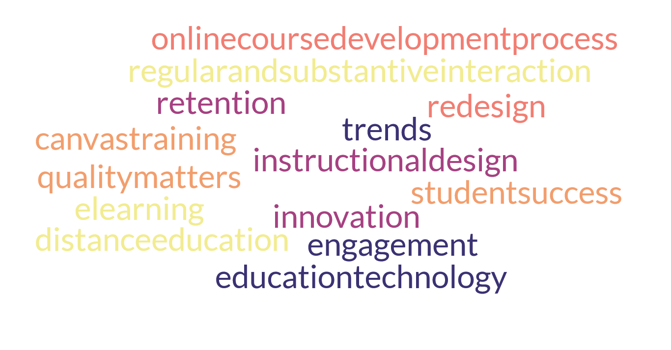 CHALLENGE
CHALLENGEWelcome to the Center for Instructional Design & Innovation (CIDI)
The mission of the Center for Instructional Design & Innovation is to champion effective instructional design best practices and education technology training to strengthen and support online learning at Neumann University.
Online Resources
The National Council for State Authorization Reciprocity Agreements (NC-SARA) is a private nonprofit organization [501(c)(3)] that helps expand students’ access to educational opportunities and ensure more efficient, consistent, and effective regulation of distance education programs.
Distance Education and Workforce Development Reports-Pennsylvania Fact Sheet
Experience the Future of Education at the Center for Instructional Design and Innovation

Frequently asked questions
How do I register for Canvas Training?
Click on the Help icon in Canvas and navigate to the Training Services Portal where you'll find on-demand and live training options.
What are the teaching expectations for online courses?
- Use the LMS template or blueprint for online and hybrid course modalities
- Upload your current syllabus to the course in the LMS
- Update your faculty contact information
- Post a welcome announcement at least one week prior to the start of class
- Post weekly course announcements.
- Review course links and update any broken links. Email digitallearninginnovation@neumann.edu if other links need to be replaced.
- Update all assignment due dates.
- Use the Attendance tool in the LMS as it is critical to retention data
- Provide RSI- meaningful and timely feedback
What are the attendance reporting requirements?
The Census Certification Process entails verification of enrollment through attendance reporting for financial aid purposes. The Census due date, provides a snapshot of attendance, which includes attending and never attended.
To comply with the Census Certification Process for all courses, the University Registrar's Office requires attendance reporting in Self Service at the beginning of the semester.
In addition due to the impact on retention, it is recommended to regularly track attendance facilitated by using the Attendance tool (Roll Call) in Canvas. https://community.canvaslms.com/t5/Canvas-Basics-Guide/What-is-the-Roll-Call-Attendance-Tool/ta-p/59
What is Universal Design for Learning?
"Universal Design for Learning (UDL) is a framework to improve and optimize teaching and learning for all people based on scientific insights into how humans learn."
What course elements are essential for all online courses?
Essential online course elements include a Start Here module, syllabus, course schedule, introduction video, learning outcomes, presentations for each instructional unit, student engagement activities, graded and non graded assessments, and communication expectations and instructions.
What are effective online teaching strategies?
Effective online teaching provides many opportunities for engagement with the course content, peers and the instructor. Moreover, the teaching and learning experience supports interactivity as well regular and substantive feedback. A valuable resource is the IDEAS (Inclusion, Design, Engagement Evaluation, Assessment and Support) Framework for Teaching Online (Educause, 2023)
https://er.educause.edu/articles/2023/4/ideas-framework-for-teaching-online
What is Quality Matters?
Quality Matters began with a small group of colleagues in the MarylandOnline, Inc. (MOL) consortium...In 2003 MOL outlined how the Quality Matters program could create a scalable process for course quality assurance, and applied for a Fund for the Improvement of Postsecondary Education (FIPSE) grant from the U.S. Department of Education... the FIPSE grant ended in 2006, QM persisted as a self-sustaining program within MOL and was used to impact the quality of teaching and learning at a state and national level.
In the years that followed, more than 1500 colleges and universities throughout the world joined the QM community and used the HE Rubric to improve course design. (Quality Matters)
What tools can be used to identify and address Accessibility issues?
Canvas has several feature to enhance course accessibility including the Calendar Agenda View, the Chat tool which enables audio notifications, the Rich Content Editor. To learn more visit: https://community.canvaslms.com/t5/Canvas-Basics-Guide/What-are-the-Canvas-accessibility-standards/ta-p/1564
The Center for Distributed Learning (CDL) at the University Central Florida created the Universal Design Online content Inspection Tool (UDOIT)
Canvas Resource: General Accessibility Design Guidelines